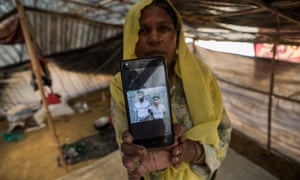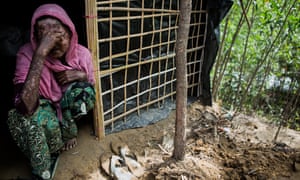
Amnesty International has accused Myanmar’s security forces of committing crimes against humanity as hundreds of thousands of Rohingya women, men, and children have fled the country.
In a report released on Wednesday Amnesty cited testimony from more 120 Rohingya men and women who have fled to Bangladesh in recent weeks, part of a half-a-million-strong exodus of people escaping a bloody army campaign.
Thirty medical professionals, aid workers, journalists and Bangladeshi officials, were also interviewed for the research, titled “My World Is Finished”, and Amnesty also referred to satellite imagery, as well as on-the-ground video footage.
Amnesty said some of the worst atrocities were committed in Min Gyi, or Tula Toli, a village identified by the Guardian as the site of what appeared to be a brutal massacre after army forces swept through on 30 August.
Evidence all points to the same conclusion, it said: “hundreds of thousands of Rohingya women, men, and children have been the victims of a widespread and systematic attack, amounting to crimes against humanity.”
“In this orchestrated campaign, Myanmar’s security forces have brutally meted out revenge on the entire Rohingya population of northern Rakhine State, in an apparent attempt to permanently drive them out of the country. These atrocities continue to fuel the region’s worst refugee crisis in decades,” said Tirana Hassan, Crisis Response Director at Amnesty.
“Exposing these heinous crimes is the first step on the long road to justice. Those responsible must be held to account,” she added, specifically calling for Myanmar’s commander-in-chief, senior general Min Aung Hlaing, to take immediate action to stop his troops from committing atrocities.
Myanmar has blocked media and major United Nations aid agencies from operating freely in Rakhine and newly-released satellite images from Human Rights Watch show that at least 288 villages were partially or totally destroyed by fire in northern Rakhine State.Oppressed for decades, the minority Muslim Rohingya were forced to escape after soldiers launched a massive counteroffensive across Rakhine state, a response to around 30 coordinated attacks by Rohingya militants on army outposts on 25 August.
One woman interviewed in the Amnesty report, Shara Jahan, 40, whose husband and son were shot and killed, said she was trapped in her home as the roof started to burn, with her clothes catching alight.
“I had this fire on my entire body, on my clothes. I was rolling, rolling toward the rice field. [When I got there], that’s when the fire was put out. I rolled in the little water there in the rice field,” she was quoted as saying.
An image of Jahan shows her face and arms covered in what appears to be burn scars. Amnesty referenced a forensic medical expert who said her appearance shows deep 2nd or 3rd degree burns.
Referring to the Rome Statute, a treaty that established the International Criminal Court, Amnesty said that it had documented at least six crimes against humanity.
They include murder, deportation and forcible displacement, torture, rape, persecution based on ethnic and religious grounds, including through burning of homes, and other inhumane acts such as denying food and other life-saving provisions.
Amnesty said eyewitnesses of the worst violence “consistently implicated specific units, including the Myanmar Army’s Western Command, the 33rd Light Infantry Division, and the Border Guard Police” and that troops were sometimes joined by local vigilantes.
The body said it documented events in five villages where at least a dozen people were killed, including Min Gyi, a settlement referred to by Rohingya as Tula Toli.
Ten people were interviewed from Min Gyi, whose horrific accounts Amnesty said “further corroborates what appears to be one of the worst atrocities of the Army’s ethnic cleansing campaign”.
One 15-year-old girl said that under the soldiers’ instruction, everyone was forced to crouch down by the river that snakes around the village and soldiers then took many of the women and young children to a nearby ditch.
“Soon after the Rohingya were separated by sex, the soldiers opened fire, executing primarily the men and older boys, though also hitting some women and younger children. Several survivors said some people were also killed with knives, used to slash victims across the throat,” Amnesty said.
Later, soldiers perpetrated rape and other forms of sexual violence, it added.
One woman, who Amnesty did not name, said soldiers took their money and possessions, and then they beat the women with a wooden stick.
“My children were with me. They hit them too. Shafi, my two-year-old son, he was hit hard with a wooden stick. One hit, and he was dead … Three of my children were killed.”
She added: “All of the women were stripped naked … They had very strong wooden sticks. They first hit us in the head, to make us weak. Then they hit us [in the vagina] with the wooden sticks. Then they raped us. A different soldier for each [woman].”
Amnesty International said it believed, “based on consistent, corroborating witness accounts, that soldiers massacred at least scores of Rohingya women, men, and children from Min Gyi on 30 August.”
It added: “The Guardian and Human Rights Watch have independently reached the same conclusion.”
The body said it requested government access to Rakhine to investigate abuses on the ground, including by members of the Arakan Rohingya Salvation Army (ARSA), the Rohingya armed group.
The Guardian has contacted the Myanmar government for comment.



No comments:
Post a Comment